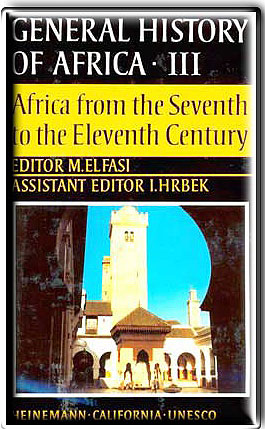webAfriqa Library
History
UNESCO — General History of Africa
Volume III.
Africa from the Seventh to the Eleventh Century
M. El Fasi & I. Hrbek, eds. 1988, 870 pp. |
 |
Contents
Note on chronology
List of figures
List of plates
Acknowledgements for plates
Preface
Amadou-Mahtar M'Bow, Former Director-General of Unesco
Description of the Project
B. A. Ogot, Former President of the International Scientific Committee for the Drafting of a General History of Africa
- Africa in the context of world history
I. Hrbek
- The coming of Islam and the expansion of the Muslim empire
M. El Fasi and I. Hrbek
- Stages in the development of Islam and its dissemination in Africa
M. El Fasi and I. Hrbek
- Islam as a social system in Africa since the seventh century
Z. Dramani-Issifou
- The peoples of the Sudan: population movements
F. De Medeiros
- The Bantu-speaking peoples and their expansion
S. Lwanga-Lunyiigo and J. Vansina
- Egypt from the Arab conquest until the end of the Fatimid state
T. Bianquis
- Christian Nubia at the height of its civilization
S. Jakobielski
- The conquest of North Africa and Berber resistance
H. Mones
- The independence of the Maghrib
M. Talbi
- The role of the Sahara and Saharlans in relationships between north and south
T. Lewicki
- The emergence of the Fātimids
I. Hrbek
- The Almoravids
I. Hrbek and J. Devisse
- Trade and trade routes in West Africa
J. Devisse
- The Chad region as a crossroads
D. Lange
- The Guinea zone: general situation
Thurstan Shaw
- The Guinean belt: the peoples between Mount Cameroon and the Ivory Coast
B. W. Andah in collaboration with J. Anquandah
- The peoples of Upper Guinea (between the Ivory Coast and the Casamance)
B. W. Andah
- The Horn of Africa
T. T. Mekouria
- Ethiopia's relations with the Muslim world
E. Cerulli
- The East African coast and the Comoro Islands
F. T. Masao and H. W. Mutoro
- The East African interior
C. Ehret
- Central Africa to the north of the Zambezi
D. W. Phillipson
- Southern Africa to the south of the Zambezi
T. N. Huffman
- Madagascar
B. Domenichini-Ramiaramanana
- African diaspora in Asia
Y. Talib based on a contribution by F. Samir
Relations between the different regions of Africa
A. Bathily with the collaboration of C. Meillassoux
- Africa from the seventh to the eleventh century: five formative centuries
J. Devisse and J. Vansina
Members of the International Scientific Committee for the drafting of a General History of Africa
Biographies of Authors
Bibliography
Index
*Note: The official designation of Côte d'Ivoire is Côte d'Ivoire in all languages but with respect to the English practice, Ivory Coast will be found in this book.
Note on chronology
It has been agreed to adopt the following method for writing dates. With regard to prehistory, dates may be written in two different ways.
One way is by reference to the present era, that is, dates BP (before present), the reference year being + 1950; all dates are negative in relation to +1950.
The other way is by reference to the beginning of the Christian era. Dates are represented in relation to the Christian era by a simple + or - sign before the date. When referring to centuries, the terms Bc and AD are replaced by “before the Christian era” and “of the Christian era”.
Some examples are as follows:
- 23oo BP = -350
- 2900 BC = -2900
AD 18oo = +18oo
- 5th century BC = 5th century before the Christian era
3rd century AD = 3rd century of the Christian era

